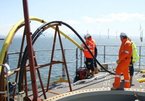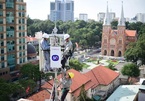 |
|
|
Speedtest also said that for fixed broadband internet, Vietnam achieved a download speed of 78.43 Mbps, far behind the world index of 107.50 Mbps.
Significant improvement is that the upload speed of Vietnam's internet exceeds the average mark, such as the mobile network at 19.25 Mbps compared to 12.35 Mbps, and the fixed broadband at 68.38 Mbps compared to 58.27 Mbps.
The fastest mobile network access speed in the world belongs to the UAE with 190.03 Mbps, followed by South Korea at 189.2 Mbps.
In the Southeast Asian region, the lead is Singapore with 85.93 Mbps, ranking 18th globally, Brunei with 59.34 Mbps (36th), Thailand 48.89 Mbps (51st) and Việt Nam (58th).
In terms of fixed broadband Internet, the world leader is Monaco with 256.7 Mbps, followed by Singapore with 256.03 Mbps.
Southeast Asia also has Thailand ranked fourth globally with 216.16 Mbps, Malaysia 46th with 100.94 Mbps, then Vietnam.
Compared to May, Vietnam dropped two places in the mobile internet rankings but increased one place in fixed broadband internet.
Speedtest's analysis showed that internet access speed in Việt Nam decreased slightly due to some incidents related to undersea fiber optic cables in July, in which the AAG route had problems twice while many countries stepped up infrastructure, especially mobile networks with new 5G systems.
It is predicted that in September, the internet speed in Việt Nam may not improve due to the error of the AAE-1 cable line and continuing to be affected by the problem with the AAG cable that occurred in July.
Not until November does AAE-1 undersea fiber optic cable repaired
The AAE-1 undersea fiber optic cable on the S1H branch will not be repaired until November.
A representative of an internet service provider (ISP) in Vietnam said that the troubleshooting schedule on the Asia-Africa-Europe 1 (AAE-1) undersea fiber optic cable route has been informed by this cable management unit to network operators in Việt Nam.
Accordingly, two faults on the S1H cable branch of the AAE-1 line will begin to be fixed from November 2 and are expected to be completed on November 14.
The AAE-1 undersea fiber optic cable had problems on the S1H section on September 4 and September 7 respectively, affecting Internet connection from Việt Nam to Singapore and Europe.
International connections are also seeing congestion at peak hours, so users may experience slowness when accessing international websites and applications such as Facebook, Youtube, Zoom and Tiktok.
Domestic internet service providers which exploit the AAE-1 line are trying to adjust international bandwidth capacity to ensure services for customers.
The AAE-1 is among important submarine cable systems of Vietnam alongside four others of the Asia-America Gateway (AAG), the Asia-Pacific Gateway (APG), the TGN-Intra Asia Cable System (TGN-IA), and the South-East Asia-Middle East-Western Europe 3 (SMW-3).
It has a total length of 23,000km stretching 19 countries and territories in Asia, Africa and Europe.
This is the second time the system has faced a problem this year, with the first occurring on May 26 and recovering fully in mid-July.
Meanwhile, another undersea cable route, Asia America Gateway (AAG), has not been fully restored yet due to an error arising on August 11 on the S1B branch from Hong Kong to Singapore of the cable route.
Vietnam-Singapore AAG capacity continues to be lost. It is expected that the AAG cable line will be repaired on September 26, when the transmission channels on the route will be fully restored.
Source: VNS

Internet speed expected to improve after AAE-1 submarine cable is fixed in mid-Nov
Two errors on the S1H branch of the AAE-1 submarine cable are scheduled to be fixed on November 2-14, a local Internet service provider (ISP) told VietNamNet.

Where is Vietnam in the global digital race?
Vietnam is one of the fastest growing internet-based economies in the region. E-commerce revenue has been growing at a rate similar to the growth rate of world e-commerce revenue and higher than the country’s GDP growth.